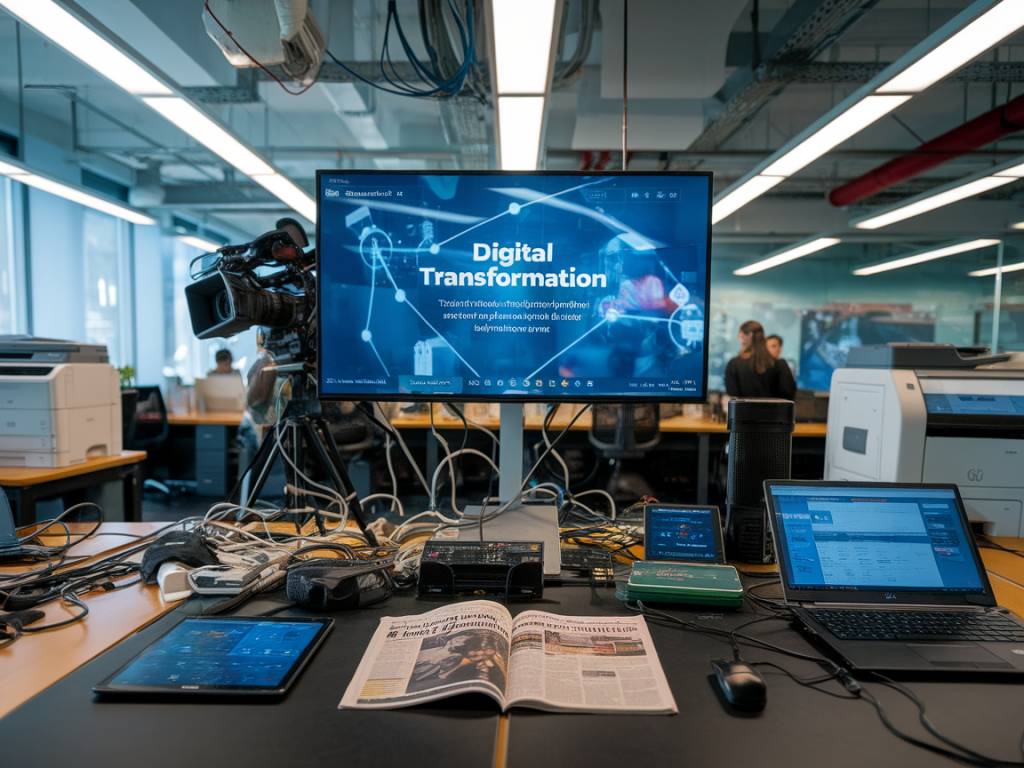The ever-evolving landscape of digital transformation has significantly impacted a variety of industries, and traditional media platforms are no exception. As technology advances, traditional media is compelled to adapt to new methods of content delivery, audience engagement, and revenue generation. This transformation has led to a complex relationship between new digital platforms and conventional media outlets. This article delves into the significant effects of digital transformation on traditional media platforms, offering insights into the profound changes and the potential future trajectory of the industry.
Understanding Digital Transformation
Digital transformation refers to the integration of digital technology into all areas of a business, fundamentally changing how you operate and deliver value to customers. In the context of media, it implies the shift from traditional forms such as print and broadcast to digital formats like online articles, streaming services, and social media. This change is driven by two primary factors: the increasing penetration of the internet and the widespread adoption of smart devices.
The Shift from Print to Online
The move from print to online media has been one of the most visible impacts of digital transformation on traditional media platforms. Newspapers and magazines, once dominantly physical products, have had to develop robust online versions to remain relevant. Here’s a closer look:
- Accessibility and Convenience: Online platforms offer readers instant access to news and articles, eliminating the wait time associated with print delivery. This ease of access has contributed to a declining readership for physical newspapers and magazines.
- Cost-Effectiveness: For publishers, digital formats eliminate printing and distribution costs, making it more economical to operate.
- Interactive Content: Digital platforms allow for multimedia content, including videos, podcasts, and interactive graphics, providing a more engaging reader experience.
Impact on Broadcast Media
Broadcast media, comprising television and radio, has also experienced significant shifts due to digital transformation. Streaming services, podcasts, and digital radio stations have introduced competition to traditional broadcast enterprises.
- Content On-Demand: Services like Netflix, Hulu, and Spotify offer on-demand content, allowing audiences to consume media at their convenience rather than adhering to broadcast schedules.
- Ad Revenue Shifts: Traditional broadcast media rely heavily on advertising revenue. However, digital transformation has led to a shift in ad dollars from TV and radio to online platforms such as social media and search engines.
- Personalization: Digital platforms employ algorithms to recommend content based on user preferences, offering a more personalized viewing and listening experience than traditional broadcast could.
Role of Social Media
Social media platforms like Facebook, Twitter, and Instagram have become major players in the dissemination of news and entertainment. Traditional media outlets have had to adapt to these new distribution channels.
- Real-Time Engagement: Social media allows for real-time interaction with audiences, providing immediate feedback and fostering community engagement.
- Viral Content: The shareability of content on social media leads to a rapid spread, which traditional media platforms struggle to match.
- Influencer Partnerships: Traditional media often collaborates with social media influencers to reach new audiences and enhance brand visibility.
Economic Implications
The economic model of traditional media has been fundamentally altered by digital transformation. From subscription models to freemium and ad-supported content, there are several new revenue strategies in play.
- Subscription Models: Many traditional media outlets have shifted to subscription-based models for their digital content, offering premium content to paying subscribers.
- Freemium Models: This model allows users to access basic content for free while charging for premium features, a common strategy among digital-only news outlets.
- Ad-Supported Content: Digital platforms often use targeted advertising to monetize content, leveraging user data to deliver personalized ads and maximize ad revenue.
Challenges and Opportunities
While digital transformation presents numerous opportunities, it also brings significant challenges for traditional media outlets.
- Content Authenticity: The rapid spread of information on digital platforms has led to concerns over fake news and misinformation, challenging traditional media’s role as a trusted source of information.
- Skill Gaps: There is a need for traditional media professionals to acquire new digital skills, which can be a barrier to effective transformation.
- Resource Allocation: Balancing investment in traditional versus digital platforms can be a strategic dilemma for media companies.
However, digital transformation also opens up new avenues for growth and innovation. Traditional media companies have the opportunity to diversify their content offerings, explore new monetization models, and reach a global audience.
Future Outlook
The future of traditional media in the digital age is likely to be characterized by further convergence and collaboration between digital and conventional media platforms. Technologies such as artificial intelligence, augmented reality, and blockchain can bring transformative changes in how content is produced, distributed, and monetized. Furthermore, as audiences continue to demand more interactive and personalized content, traditional media will need to adapt continuously to stay relevant.
In summary, digital transformation is not just a shift but a comprehensive evolution for traditional media platforms. Embracing this change is not only essential but also exciting as it opens up boundless opportunities for innovation and growth. Traditional media companies that successfully integrate digital strategies will thrive in the modern landscape, establishing themselves as versatile and resilient players in the industry.
